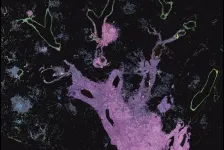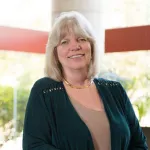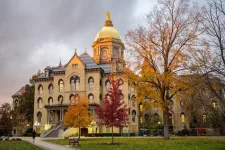(Press-News.org) The Fannie and John Hertz Foundation today announced 45 finalists for the 2024 Hertz Fellowships in applied science, mathematics and engineering.
Selected from more than 860 applicants and representing 21 universities, the finalists advance to a culminating round of interviews for one of the most competitive and coveted doctoral fellowships in the nation. The 2024 class of Hertz Fellows will be announced in May.
Since 1963, the Hertz Foundation has granted fellowships empowering the nation’s most promising young minds in science and technology. Hertz Fellows receive five years of funding, which offers flexibility from the traditional constraints of graduate training and the independence needed to pursue research that tackles some of the most pressing challenges facing our nation and the world.
The Hertz Fellowship experience continues beyond the initial award to include permanent membership in a multigenerational, intellectual community of peers that includes some of the nation’s most noted science and technology leaders. Fellows are able to deepen their experience through mentorship activities, events and professional development opportunities and networking. These opportunities have led Hertz Fellows to form research collaborations, commercialize technology, and create and invest in early-stage companies together.
"This year’s finalists embody the Hertz Foundation's mission of thinking bigger and pursuing goals that will have an outsize and enduring impact on behalf of the nation and the world," said Derek Haseltine, director of the Hertz Fellowship Program. "At this early stage of their career, each one of these individuals has already demonstrated high amounts of initiative and creativity in their work and the innovative mindset needed to solve complex problems."
The Hertz Foundation is committed to investing in future science and technology leaders who will fuel our nation’s security and economic vitality through life-changing innovations. Achieving these innovations requires bold ideas and relentless drive — qualities that are at the heart of Hertz Fellows. Through a highly rigorous selection process, led by Hertz Fellows Philip Welkhoff, director of the malaria program at the Bill & Melinda Gates Foundation and Anna Bershteyn, associate professor of population health at New York University, the Hertz Fellowship selection committee seeks out exemplary candidates poised to continually think bigger and pursue goals that will have a transformational and lasting impact on our society.
Throughout the foundation’s 60-year history of awarding fellowships, more than 1280 Hertz Fellows have established a remarkable track record of accomplishments. Their ranks include two Nobel laureates; recipients of 11 Breakthrough Prizes and three MacArthur Foundation “genius awards”; and winners of the Turing Award, the Fields Medal, the National Medal of Technology, and the National Medal of Science. In addition, 53 are members of the National Academies of Sciences, Engineering and Medicine, and 34 are fellows of the American Association for the Advancement of Science. Hertz Fellows hold over 3,000 patents, have founded more than 375 companies, and have created hundreds of thousands of science and technology jobs.
2024 Hertz Fellowship Finalists
Finalists are listed with their field of study and most recent university affiliation.
Jessica Alexander
Neurolinguistics
The University of Texas at Austin
Undergrad: Boston University
Emmy Blumenthal
Physics and Mathematics
Undergrad: Boston University
Virginia Canestraight
Chemical Engineering
Undergrad: California Institute of Technology
Andrea Cicirello
Materials Science and Engineering
Cornell University
Undergrad: Wichita State University
David Darrow
Applied Mathematics
Massachusetts Institute of Technology
Undergrad: Massachusetts Institute of Technology
Matthew Deitke
Computer Science and Engineering
University of Washington
Undergrad: University of Washington
Azim Dharani
Chemistry
Harvard University
Undergrad: Duke University
Maximilian Du
Computer Science and Engineering
Undergrad: Stanford University
Owen Dugan
Physics
Undergrad: Massachusetts Institute of Technology
Kyle Fridberg
Applied Mathematics
Cornell University
Undergrad: Harvard University
Kaylie Hausknecht
Physics
Undergrad: Harvard University
David Hoyos
Quantitative Biology
Weill Cornell Medicine
Undergrad: Princeton University
Mika Jain
Computer Science
Stanford University
Undergrad: Stanford University
Jill Jones
Neuroscience
Harvard University-Massachusetts Institute of Technology
Undergrad: Duke University
Dana Kachman
Electrical Engineering
Undergrad: Johns Hopkins University
Helen Kang
Computational Genetics and Neuroscience
Massachusetts Institute of Technology
Undergrad: University of California, Berkeley
Nivedita Kanrar
Quantitative Biology and Bioengineering
Princeton University
Undergrad: California Institute of Technology
Aayush Karan
Quantum Science and Engineering
Harvard University
Undergrad: Harvard University
Vassilios Kaxiras
Physics
Undergrad: Harvard University
Raphael Kay
Materials Science and Mechanical Engineering
Harvard University
Undergrad: University of Toronto
Calton Kong
Materials Science
Undergrad: University of California, Berkeley
Constance Kraay
Biophysics
Harvard University
Undergrad: Harvard University
Steven Labalme
Chemistry and Mathematics
Undergrad: University of Chicago
Andrew Laeuger
Physics
California Institute of Technology
Undergrad: Northwestern University
Andrew Langford
Astrodynamics
Purdue University
Undergrad: University of Notre Dame
Elijah Lew-Smith
Physics
Undergrad: Brown University
Rupert Li
Applied Mathematics
Undergrad: Massachusetts Institute of Technology
Amani Maina-Kilaas
Cognitive Science
Massachusetts Institute of Technology
Undergrad: Harvey Mudd College
Zöe Marschner
Computer Science
Carnegie Mellon University
Undergrad: Massachusetts Institute of Technology
Benjamin McDonough
Physics and Mathematics
Undergrad: Yale University
Ryan Mei
Electrical Engineering and Computer Science
Massachusetts Institute of Technology
Undergrad: University of California, Berkeley
Casey Mogilevsky
Bioengineering
University of Pennsylvania
Undergrad: University of California, Berkeley
Zijian Niu
Quantitative Biology and Bioengineering
Undergrad: University of Pennsylvania
Robert Novak
Immunology
Harvard University
Undergrad: University of Pennsylvania
Noah Okada
Cognitive Neuroscience
California Institute of Technology
Undergrad: Emory University
Michael Ren
Mathematics
Cambridge University
Undergrad: Massachusetts Institute of Technology
James Roney
Computational Biology
Undergrad: Harvard University
Anna Sappington
Computational Biology
Harvard University, Massachusetts Institute of Technology
Undergrad: Massachusetts Institute of Technology
Nathaniel Selub
Physics
Undergrad: University of Chicago
Ivan Specht
Mathematics and Statistics
Undergrad: Harvard University
Meghan Sullivan
Chemistry
Harvard University
Undergrad: SUNY University at Buffalo
Alexander Uyttendaele
Applied Mathematics
Undergrad: University of Pennsylvania
Jason Yang
Genetics
Stanford University
Undergrad: Massachusetts Institute of Technology
William Yik
Computer Science and Mathematics
Undergrad: Harvey Mudd College
Callie Zheng
Chemical and Biological Engineering
Undergrad: Princeton University
END
45 finalists named for the 2024 Hertz Fellowships
2024-02-08
ELSE PRESS RELEASES FROM THIS DATE:
How one type of lung cancer can transform into another
2024-02-08
Lung tumors called adenocarcinomas sometimes respond to initially effective treatments by transforming into a much more aggressive small cell lung cancer (SCLC) that spreads rapidly and has few options for treatment. Researchers at Weill Cornell Medicine have developed a mouse model that illuminates this problematic process, known as histological transformation. The findings advance the understanding of how mutated genes can trigger cancer evolution and suggest targets for more effective treatments.
The researchers, whose results were published ...
Results from South Pole Telescope’s new camera emerge
2024-02-08
Argonne is part of a multi-institutional effort to survey the sky for clues about the origins and nature of our universe.
For more than five years, scientists at the South Pole Telescope in Antarctica have been observing the sky with an upgraded camera. The extended gaze toward the cosmos is picking up remnant light from the universe’s early formation. Now researchers have analyzed an initial batch of data, publishing details in the journal Physical Review D. The results from this limited dataset hint at even more powerful future insights about the nature of our universe.
The telescope at the Amundsen-Scott South Pole Station, which is operated by the National ...
Rosenthal Department of Management established at McCombs School of Business
2024-02-08
AUSTIN, Texas — The Management Department in the McCombs School of Business at The University of Texas at Austin has long been recognized as a powerhouse for research excellence and teaching innovation. Now, it holds a new distinction. It is the first academic department in the business school to be named as the result of a generous gift.
The newly named Rozanne and Billy Rosenthal Department of Management has been made possible by a $25 million gift from two married Longhorns, Rozanne Rosenthal, B.S. ’74, and Billy Rosenthal, BBA ’72. ...
Professor of Finance named ECGI Fellow
2024-02-08
AUSTIN, Texas -- In recognition of her research and scholarship, Laura Starks, a professor of finance at The University of Texas at Austin, was recently named a fellow of the European Corporate Governance Institute (ECGI). She is among eight new fellows selected from academia in Europe and the United States. ECGI, founded in 2002, is an international scientific nonprofit association that serves as a forum on corporate governance among academics, legislators, and practitioners.
Starks is the George Kozmetsky Centennial University Distinguished Chair in the McCombs School of ...
NJIT researchers unveil method to detect 'forever chemicals' in under 3 minutes
2024-02-08
PFAS have earned the name “forever chemicals” with good reason — the man-made compounds, which can take thousands of years to degrade and are found in everything from grease-resistant food packaging to water-repellent clothing, have made their way into nearly half the U.S. tap water supply.
Now, in a study featured in Elsevier’s Journal of Hazardous Materials, New Jersey Institute of Technology chemists have demonstrated a new lab-based method to detect traces of PFAS from food packaging material, water and soil samples in just three minutes or less.
Researchers say their approach could ...
Exploring new futures in space: a revolutionary integration of neuroscience, quantum physics, and space exploration
2024-02-08
February 8, 2024, Mountain View, CA — The SETI Institute, leading humanity's quest to understand the origins and prevalence of life and intelligence in the universe and share that knowledge with the world, is pioneering innovative approaches to understanding our place in the cosmos. The SETI Institute is proud to support a groundbreaking project from London-based filmmaker and SETI Institute Designer of Experiences Dr. Nelly Ben Hayoun-Stépanian that combines insights from intergenerational trauma, neuroscience, quantum physics, and ...
Technique could improve the sensitivity of quantum sensing devices
2024-02-08
In quantum sensing, atomic-scale quantum systems are used to measure electromagnetic fields, as well as properties like rotation, acceleration, and distance, far more precisely than classical sensors can. The technology could enable devices that image the brain with unprecedented detail, for example, or air traffic control systems with precise positioning accuracy.
As many real-world quantum sensing devices are emerging, one promising direction is the use of microscopic defects inside diamonds to create “qubits” that can be used for quantum sensing. Qubits are the building blocks of quantum ...
New process allows full recovery of starting materials from tough polymer composites
2024-02-08
In a win for chemistry, inventors at the Department of Energy’s Oak Ridge National Laboratory have designed a closed-loop path for synthesizing an exceptionally tough carbon-fiber-reinforced polymer, or CFRP, and later recovering all of its starting materials.
A lightweight, strong and tough composite material, CFRP is useful for reducing weight and increasing fuel efficiency of automobiles, airplanes and spacecraft. However, conventional CFRPs are difficult to recycle. Most have been single-use materials, so their carbon footprint is significant. By contrast, ORNL’s closed-loop ...
Notre Dame joins consortium to support responsible artificial intelligence
2024-02-08
Extraordinary technological innovations have driven an expansion in artificial intelligence (AI) use. At the same time, they have brought little-understood risks to every sector of the economy.
Now, as part of a new consortium, University of Notre Dame researchers will help establish the advanced measurement techniques required to identify the risks associated with current AI systems and to develop new systems that are safer and more trustworthy.
The consortium, called the Artificial Intelligence Safety Institute Consortium (AISIC), was formed by the National Institute of Standards and Technology, an agency of the U.S. Department of Commerce that works to develop standards for ...
AI-based system to guide stroke treatment decisions may help prevent another stroke
2024-02-08
Research Highlights:
An artificial intelligence (AI) system to help guide treatment decisions for stroke patients led to improved stroke care quality and fewer recurrent strokes, heart attacks and vascular death among stroke survivors three months after a stroke.
The study, conducted in hospitals in China, compared artificial intelligence-based evaluation and treatment for ischemic stroke patients to standard evaluation and treatment by the stroke care team.
Embargoed until 12:16 p.m. MT/2:16 p.m. ET, Thursday, Feb. 8, 2024
PHOENIX, Feb. 8, 2024 — Ischemic stroke survivors who received care recommendations from an ...






